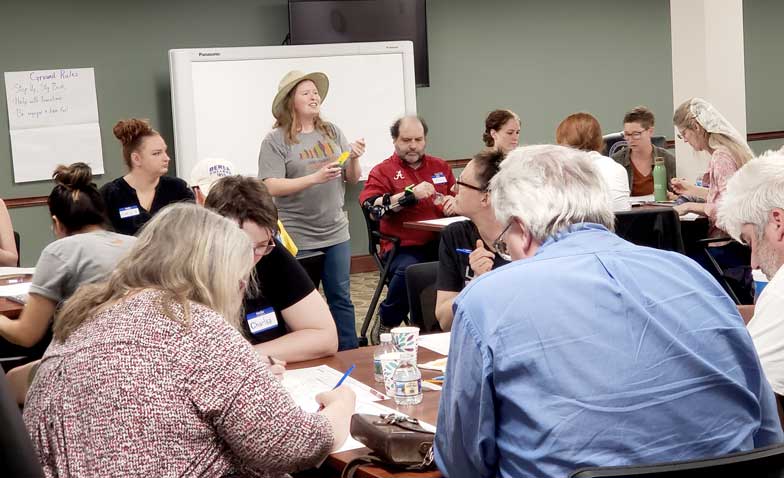Residents claiming ownership of public spaces in Berea
How do we engage people outside of KFTC in conversation about what they care about in their community?
That was not the question we set out to answer when we started a project about public spaces in Berea. We were thinking about how people used our public spaces. We wanted to explore what were barriers to people using public spaces and what people wanted to see in their community.
It turns out people were really interested in talking about the parks, the library, the trails and their neighborhoods. We were able to engage people who had never heard about KFTC and some who likely wouldn’t support our platform in an informative conversation that is helping to guide work here in Berea.
We started looking into the issue, considering what the literature had to say about public spaces. The Project for Public Spaces was a great asset to this exploration.
We determined that we would utilize a combination of a survey with canvassing and neighborhood conversations, and end by presenting to city council. And with an idea of what we wanted to accomplish and how, we started talking to everyone who would listen: the mayor, friends, city council people, pastors.
We would explain the project and get their input and ideas and names of more people to contact. It was through this method that we found a local expert in playgrounds and decided to include a public forum after the neighborhood conversations.
Then we developed and launched a survey to ask about which places people use, the challenges they have to using them and the ideas they have for making spaces better. We kept it open for a month, reposting it at least once a week, and we took to the streets and canvassed low-income and higher minority areas in Berea.
We put the word out that we also were trying to have neighborhood conversations about this, and we were able to get three neighborhood hosts to organize small gatherings of 5-10 people for a conversation. We provided the facilitation and food, and they provided the location and people.
During canvassing and neighborhood conversations, people had things to say:
“We have a city park? Where is it? Oh, I thought that was the school park.”
“I love the library – it became like a second home to me when my kids were little.”
“There are areas in my neighborhood that aren’t safe. We have to take care of that.”
“We don’t have good sidewalks here, see? I just want to walk with my mom, who is disabled.”
During the neighborhood conversations, folks shared about what their neighborhood was like and what they would like to see. Concerns about walkability and safety arose at all three conversations. Plans were made to have BBQs and to clean up certain areas.
The public forum brought more than 20 people together to explore the results of the survey, hear from representatives from the neighborhood conversations, to hear about awesome work happening around public spaces in Berea and to continue to dream.
Great connections were made, and the overarching theme of the conversation was that more community-wide support was needed to make lasting change.
After three months of work, we presented results of the project to the city council, with final recommendations as follows:
- Create a comprehensive “public space agenda” that considers Berea’s assets, Berea’s needs and incorporates local neighborhood development as well as the more robust city park system.
- Improve signage for the park system.
- Partner with tourism officials to create a comprehensive map that is easily readable and shows all public spaces that people can enjoy; provide it to new residents as well as tourists (could also create an app for this).
- Remember that investment in great public spaces pays dividends in economic, health and community outcomes!
These recommendations seemed to be well received, and we hope to continue to explore this topic within our KFTC chapter because it helped us engage non-members in non-intrusive ways on issues that impact the public good.

Recent News
Kentucky’s past legislative session showed alarming trend toward government secrecy
Churchill Downs takes more than it gives. That's why the Kentucky Derby is a no-go for me
‘We must never forget.’ Kentucky town installs markers for lynching victims.
Featured Posts
TJC Rolling Out The Vote Tour – a KFTC Reflection Essay
KFTC Voter Empowerment Contractor Reflection Essay
Voting is Power
Archives
- Home
- |
- Sitemap
- |
- Get Involved
- |
- Privacy Policy
- |
- Press
- |
- About
- |
- Bill Tracker
- |
- Contact
- |
- Links
- |
- RSS

